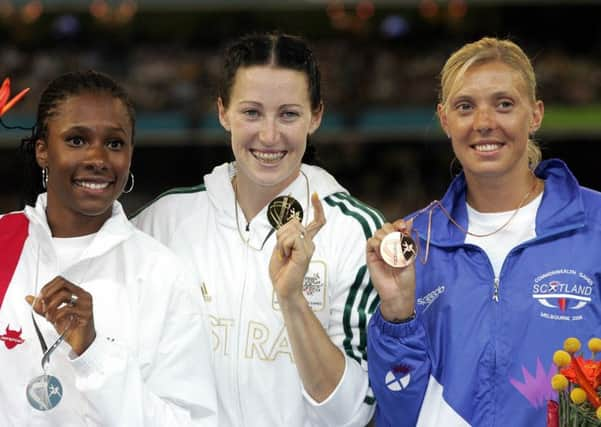Melbourne 2006 Games hold special memories for Lee McConnell


With the athletics getting under way today at this year’s Gold Coast Games, the former Shaftesbury Barnet runner – now mother of two young boys – reflected on her big adventure to Oz a dozen years ago.
“I suppose this time around is quite similar to what we faced back in 2006,” said McConnell.
Advertisement
Hide AdAdvertisement
Hide Ad“It is so early in the year – compared to what we would describe as being your normal outdoor season – and, back then, that definitely threw up a few issues in terms of preparation.”
Having won silver in the 400m flat at the Commonwealth Games in Manchester in 2002, McConnell’s switch to hurdles four years later saw her land bronze in Melbourne.
“The year before the [2006] Commonwealth Games was my first over 400 hurdles, so it was all new to me,” recalls the Scot. “I’d failed to make the GB World Championship team in that event, but still qualified for the team in the 400m [flat] and won a bronze in the relay.
“I had the qualification standard for Melbourne in both events, from the previous year, but we weren’t absolutely 100 per cent sure what I was going to do.
“In terms of preparations and training, you had a choice to make. After the 2005 season, and deciding to do the 400 hurdles, there was no point, in my mind, about doing the indoor season. There was nothing to be achieved really. I wasn’t going to be hurdling and I really needed to be doing that.”
A lot of hurdling is about calculation. But McConnell was also calculating when it came to making the final call on what event to pursue.
“A group of us went out to Australia a good five weeks ahead of the Games, and this was to give us as long a period to prepare as possible. I’d been training in Glasgow, but then we flew out and set up in Bendigo where the Scotland team would have their holding camp.
“A month or so before the Games, when we arrived, no-one was there. It wasn’t open. We had to get shifted in to other accommodation with a couple of the Scottish Athletics coaches who’d been sent out to look after us.
Advertisement
Hide AdAdvertisement
Hide Ad“While we were training, I only had a couple of races over hurdles. I’ll admit, none of them were particularly great. And that’s putting it mildly! To be honest, I was running really well – just not when it came to hurdles. The temptation would have been to concentrate on 400 flat, but I really wanted to do the hurdles so stuck with it.
“There was also the matter of who I’d be up against over 400m; Christine Ohuruogu would be there, as would the Olympic champion from Athens, Tonique Williams-Darling who was representing the Bahamas. They did win gold and silver eventually.
“Even making the final, and there was no guarantee I’d do that, getting on the podium would be tough. I knew getting a medal at 400m hurdles was something I was capable of, if I put it together. But above all else, and I was determined, having made the switch in the first place, to do the hurdles.
“After winning silver in Manchester, I wasn’t sure I could improve on that. Did I want two silvers, at best, or to prove myself in another event. And, if I managed to get a medal, it was always going to mean more to me, because I’d taken that big step to concentrate on hurdles.
“Was it a gamble? A wee bit.
“Thankfully, in Melbourne, I managed to stick a couple of races together; first, coming through the heats to qualify, and then in the final. And when I say stuck, I mean stuck!
“My flat speed was good, getting the hurdles right – technique, stride pattern and the likes – was what I had to really concentrate on. And it paid off.’
Lee took bronze, producing another personal best in the final, taking four-tenths of her previous best, set in qualifying.
“It worked out how I’d expected, in the end. Natasha Danvers won silver, but the reality was that three or four of us were all in contention for a medal of some colour, because the gold would always be going to Jana Pittman, providing she stayed fit and didn’t fall over.
Advertisement
Hide AdAdvertisement
Hide Ad“The funny thing is that, as an athlete, you don’t think about or dwell on the medal. OK, I’ve got it, great. But you just want to get back, get training, keep the focus and momentum going, and get ready for the next season and whatever major championship is coming along. In some ways you never really appreciate what you’ve done.”
While special in its own way, Melbourne wasn’t Lee’s favourite championship.
“Manchester was my favourite for a number of reasons; it was my first, it was so close to home and it meant that you’d have family and friends there. Even the spectators, although we were racing for Scotland, they were very supportive. But none of those things applied really in Melbourne,
“I still enjoyed Melbourne and Australia. It was just so nice to get the sun for all that time.
“We weren’t used to that in Glasgow. I think we stuck out a wee bit being so white…”
This interview first appeared in Scottish Athletics magazine PB.